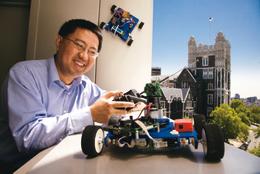
Professor Jizhong Xiao with City-Climber robot.
Award to Jizhong Xiao Will Assess Marketability of City-Climber Wall Climbing Robot
Dr. Jizhong Xiao, associate professor of electrical engineering in CCNY’s Grove School of Engineering was awarded a six-month, $50,000 commercialization grant from the National Science Foundation Innovation Corps (I-Corps) program. Professor Xiao will use the award to assess the commercial readiness of the City-Climber, a mobile robot capable of climbing walls and running along ceilings.
“This [is a] new program. Essentially they choose the most promising technology that can transfer from lab to market,” explained Professor Xiao. “It reprograms the researcher into an entrepreneur [and helps] the transition of laboratory innovation to the market to create jobs.”
The NSF I-Corps program is intended to facilitate development of scientific and engineering discoveries into useful technologies, products and processes. Professor Xiao’s team was one of 24 selected for its second cohort of grantees.
Working with Professor Xiao on the project, called “Roadmap to Commercialization of City-Climber Technology,” are: Mickey Muldoon, a computer science graduate student at Brooklyn College who earned his bachelor’s degree at Harvard University, serving as the entrepreneurial lead, and Dr. John A. Blaho, director of industry-university research collaborations at the CUNY Center for Advanced Technology, serving as the industrial mentor.
The team will attend three learning exercise workshops about entrepreneurship at Stanford University led by Steven Blank, a retired entrepreneur who led or participated in eight Silicon Valley startup ventures. In addition, the team will participate in eight weekly webinars to learn the basics of entrepreneurship, such as creating a business model.
At the end of the eight weeks, the team will return to Stanford University to present their business model to venture capitalists, in hope of attracting investments and creating a company. To demonstrate its commercial viability, the business model must demonstrate how the City-Climber can solve problems for potential customers.
Professor Xiao said he believes the City-Climber can be used for automated building inspections including inhospitable environments such as nuclear cooling towers, chemical storage tanks and the foundations of dams and bridges. He is also working with an in-house design team of CCNY senior undergraduate students on a new prototype, called the City-Cleaner, which could clean windows and solar panels.
In 2007 Dr. Xiao, received a five-year, $400,000 CAREER grant from NSF. He used the grant proceeds to develop a general framework and theoretical foundation to address planning, control and coordination issues for robots that can operate in three-dimensional environments. His investigation focused on getting multiple mobile units to operate in concert with one another, especially in constrained, urban environments.
CAREER grants are NSF’s most prestigious awards for early-career faculty members. All commercialization grant awardees must have current or recent NSF funding to participate in the program.
Professor Xiao began investigating wall-climbing robots as a PhD student at Michigan State University. He developed the City-Climber, a single-module wall-climbing robot, at CCNY, where he has taught since 2002. The device relies on a vacuum chamber to produce just enough suction to keep the device clinging to the wall yet still able to maneuver freely. Sensors attached to the module help it remain attached to vertical surfaces, and video cameras aid in navigation.
On the Internet
- Professor Xiao's web page
MEDIA CONTACT
Ellis Simon
p: 212.650.6460
e:
esimon@ccny.cuny.edu